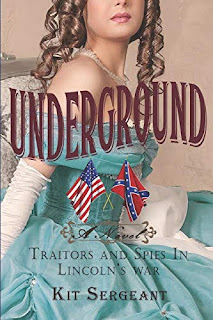Weekly Reader: Underground by Kit Sergeant; Sergeant's Female Spies Take on The American Civil War
By Julie Sara Porter
Bookworm Reviews
Spoilers: The previous book by Kit Sergeant, 355, told the story of Meg Coughlin, Sally Townsend, and Elizabeth Burgin, three women who spied during the American Revolution, one of which may have been the mysterious enigmatic "355," a woman who wrote missives directly to George Washington himself.
Her next book, Underground: Traitors and Spies in the Civil War, transports us to the War Between the States. She tells of four women who spy for both the Union and the Confederacy in a compelling narrative that gives both sides to a war that still resonates throughout American history and current events.
As with her previous works, Sergeant captures different women from various walks of life that contributed to the Civil War in their own unique ways. Hattie Lewis is the second woman employed by Pinkerton's Detective Agency (the first being Hattie's mentor,Kate Warne). After successfully and secretly hiding and protecting President Elect Abraham Lincoln from an assassination attempt, the boys at Pinkerton's take notice and offer Hattie tougher and more dangerous assignments including spying.
Mary Jane Richards Bower is an African American woman who had been freed by her employer, Miss Lizzie. Grateful, Mary Jane offers her services by working in various wealthy Confederate homes and passing information to the Union. Her contacts eventually take her to the home of one Jefferson Davis, the President of the Confederacy.
Belle Boyd is a young opinionated Southern Belle who uses her femininity and penchant for firearms to obtain information on behalf of the Confederacy in tempestuous Baltimore, which has mixed residents on both sides of the conflict.
Loretta Janeta Velazquez Williams, a New Orleans widow, takes a more direct approach to the action than the other three lead characters. She dons men's clothes and fights for the Confederacy under the name Lt. Harry T. Buford.
I have mixed feelings about this installment, as compared to 355 and L'Agent Double which I felt were terrific with no argument. Right or wrong, a lot of my emotions towards Underground have to do with current controversies towards the Confederacy and how it is presented in historical textbooks and popular culture. There are some interesting chapters where Belle uses most men's perception of femininity against them by playing the flirtatious Southern Belle while obtaining and passing information. It's also interesting that Loretta goes the opposite extreme and dons male garb to become a soldier. However, their unapologetic Southern pro slavery views make it hard to be empathetic and root for them.
Many times their racism is made completely clear as they think of black people as subhuman. Loretta is particularly upfront using derogatory terms in her first chapter. The fact that these are women challenging roles that society expects from them and they do not see the correlation towards African Americans doing the same is jarring at best and hypocritical at worst. I know we shouldn't put modern views on the past but there are times when the difference between past and present cannot be ignored and this is one of those times.
Because of that the stories of Hattie and Mary Jane are much more interesting. Hattie tries to break through the all men society of Pinkerton's and eventually earns the respect of her colleagues through her tenacity, courage, and persistence. She spends much of the book on an extended cover assignment where she and a colleague pose as husband and wife. It's a difficult assignment as Hattie must reconcile her personal feelings with her responsibility and duty as an investigator and spy.
Also interesting is Mary Jane's story. Similar to Belle using the masculine views of femininity against her opponents, Mary Jane uses white assumptions about black people against them. She poses as an illiterate kitchen maid but can read very well and is able transcribe missives and documents. She makes her employers believe that she is unintelligent when she is quite brilliant and observant. Also of the four stories, hers is the most suspenseful as Mary Jane ends up working for Jefferson Davis' household right in the belly of the beast of racism and separatism if you will. Her time there is filled with tense moments as she is well aware that any false move, any mistake, and she could be killed by a family who wouldn't bat an eyelid over killing one of their slaves.
Unlike 355 where the stories overlap as the three leads meet and become friends, there isn't much overlap between the four stories. They cover a wide ground of several states so it is not likely that these women would have been able to physically encounter each other very much. There is one awkward early chapter where Belle attempts to seduce "Harry" but Loretta leaves before too much happens, but that's it.
Instead their connections are more thematic then physical. This is particularly prominent when Belle and Hattie are imprisoned at the same time for different charges. The women handle their imprisonment in their own unique styles as Belle flirts with guards and makes powerful allies on the outside that vouch for her. Hattie faces her imprisonment with stoic patience but also quiet terror especially when one of her fellow investigators is executed.
Underground is yet another achievement in Sergeant's series by giving faces and names to women who otherwise would have gone unknown. It's about time they spoke and acted for themselves.

No comments:
Post a Comment